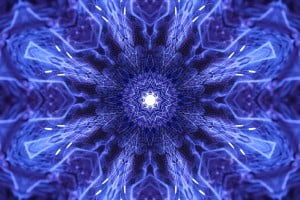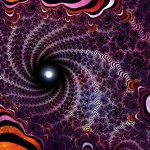If Darth Vader and Luke Skywalker can become thought forms able to influence a sensitive medium, human history becomes a great deal more complicated.
The idea of a thought form holds that we create and empower psychic energy by molding it through disciplined focused attention. The literary thought form concept suggests something similar can arise from less disciplined, less focused attention by many people over a prolonged period. This would be particularly likely if the center of focus carried emotional content and could be easily symbolized in an image, or even better, a character.
This literary thought form model fits the events related in my previous post. Making a thought form is an act of magick. It is kept potent to the degree it is “fed” with the energy of strong focused attention. An unintended thought-form is in keeping with the same model of how the mental world works, but it is independent of any particular person’s will and attention.
If such a collective creation is possible, human beings can unintentionally create formations of mental energy to some degree both independent of them and able reciprocally to influence others. Our relationship to ideas becomes more entwined than I, at least, had ever imagined.
And yet we may not be entirely unaware of this hidden reality, although we likely shrink from the full implications. (At least, I did, and still do to some degree.) Think for a moment about how we talk about ideas when we are speaking informally.
I am entranced by an idea.
I am captivated by an idea.
I am obsessed with an idea.
I am intrigued by an idea.
I am grabbed by an idea.
I cannot get an idea to leave me alone.
An idea is powerful, grand, subtle, boring, comforting, fascinating, repellant, upsetting, difficult to get hold of. These animistic terms are also used when describing our relations with other people. They treat ideas as alive and indicate that we to some degree experience them that way.
We enter into relationships with ideas. We treat them as tools and they empower us in our lives. We give them energy and they motivate us, but with this comes the possibility of “losing ourselves” in them. And then we identify with them, experience them as part of us, and lose track of who we are. We “fall under their spell.” It is a kind of entrancement.
Ideas we hold can often mean more than we initially know until we enter into them more deeply. We learn what we did not previously know as we unpack them, tease out their implications, and find that they hold surprises. Again, like people.
One of the intentions of meditation techniques is to teach us we are not our ideas. Meditation teaches us to see ideas come and go. But ideas can still grab hold of us as soon as we give them attention, particularly if it is emotional attention. We become the idea rather than observing it.
This is why scientists praise those who can distance themselves from their scientific ideas, the better to evaluate how well they describe what they claim to. It is a lesson we all should take to heart. When we fail to do this, we become the vehicles through which those ideas manifest in the world, on the idea’s terms rather than ours. They are not our tools, we are theirs.
Ideas empower or disempower us, depending on our relationship to them. And if we are disempowered, what is empowered? The reality behind the idea, the focused mental energy that constitutes it.
Writing these words reminds me of a passage by Malidoma Somé:
When power comes out of its hiddenness, it shrinks the person who brought it into the open and turns that person into a servant. The only way that overt power can remain visible is by being fed, and he who knows how to make power visible end up trapped into keeping that power visible….
Whoever creates that kind of visible power must then stay in the service to that which he creates. . . . To display power is to become servile to it in a way that is extremely disempowering. This is because the service is fueled by the terror of losing the fantasy of having power. (62-3)
Now let me shift our perspective to a wider stage: human history. History is interpreted today mostly in secular, materialistic terms. The alternative view, a minority one, sees history as the working out of a divine plan or will. But there is a third possibility that arises from taking the thought-form idea as seriously outside magickal workings as we do inside.
For thousands of years, dominant human societies have been based on ideas of hierarchy, subordination, and obedience. They have been given religious reality (as in Catholicism), economic reality (as in feudalism and slavery), political reality (as in despotism and absolutism), and interpersonal reality (as in hierarchical family structures). The modern liberal world of science, markets, and democracy grew within that world. Yet it won a degree of independence from it through the power of its ideas about human rights, equality, and freedom—particularly when brought to the “new world,” where disease had wiped out most of the original inhabitants but where, in North America in particular, the types of domination so prevalent in Europe had never taken hold. Perhaps this weakened the hold of these hierarchical ways of thought that, in time, enabled other ideas to grow.
Whatever the cause, liberal ideas began a transformation of humanity, a transformation as dramatic as when the first agricultural hierarchies triumphed over the more egalitarian hunting and gathering societies of our evolutionary heritage. For the first time in millennia, the world of hierarchy, domination, and universal subordination was put on the defensive. And as liberal institutions of science, the market, and democracy transformed their world, liberal ideas were validated and spread from two places relatively secure against the old powers: the US and Great Britain. An alternative thought-form universe was created.
The old thought-forms of domination, hierarchy, and obedience did not disappear. They sought to manifest wherever they could, inaugurating a profound struggle in the West between what we might simply call freedom and slavery.
In the US, these thought forms’ most powerful stronghold was the antebellum South. The South’s leaders increasingly turned their back on the Declaration of Independence because they knew it to be fundamentally hostile to slavery. For them, domination trumped equality. They lost a war, but still maintained a way of life reflecting the old values, reinforced by a form of religion that supported slavery and rigid hierarchy, both secular and divine.
In 2012, these hierarchical energies made a final stab at regaining their domination. Their followers, those people most possessed by them, selected most of the Republican candidates and forced the victor to ape their values, even though Romney seems to have no values beyond his desire for power. He seems a perfect example of Malidome Somé’s warning.
They lost that election. And while Nov 6, 2012, is hardly the beginning of utopia, it marked the final defeat of the NeoConfederate attempt to rule America, at least within the framework of our existing institutions. Demographic, value, and religious shifts promise that their followers are part of a steadily diminishing minority.
Those old forms of domination and repression are threatened more radically than ever before, and their interests are distinct from the interests of their human carriers. Politicians are notorious for their willingness to bend with the wind and say one thing while doing another. But today we are seeing Republican politicians and their allies act differently.
They are seeking to destroy the democratic electoral processes in the US, even when their own population is against them. Their attack has moved from efforts to disenfranchise citizens to direct attacks on how Presidents have been elected for our entire history, in a blatant effort to guarantee the candidate with the least support from the people wins. They increased their attacks on women’s autonomy even though political calculation should have told them to stay away from something that had already backfired so badly. Today I read that in New Mexico, a Republican introduced a bill requiring women made pregnant by rape to keep the fetus as “evidence” until the trial, which means for all intents and purposes, to carry it to term. Gun violence has also ratcheted up, with almost insane proposals by the NRA and similar parties in and out of elected office attempting to make guns ubiquitous in our society.
What we are seeing now are people captivated by these hierarchical ideas literally freaking out. This is no way to prolong one’s political career. These are not the actions of self-interested political people who simply see the world differently than we do. It is a kind of political primal scream, a threat to take everything down if they cannot win. If they can create chaos, they create conditions favorable for that Power to have another shot at domination. They will likely lose personally in their attempt, but Power does not care for persons, it cares for being exercised.
Power feeds on emotion, especially fear. It avoids and distrusts reason. Those who fear look to protectors, and Power as Domination, Hierarchy, and Subordination is happy to fill the need. With enough fear, many people will give up almost everything for ‘peace’ even if it is the peace of a doormat over which the powerful tread. As a leading Neoconservative and Harvard professor Harvey Mansfield said in a book beloved by people of his kind, “manly” men are needed to protect us and “the claim to protect is the claim to rule. How can I protect you properly if I can’t tell you what to do?” (66).
Mansfield and others who are fascinated by Power as domination are repelled by the modern world: its egalitarianism, its refusal to hold that our differences mean someone is superior and someone is inferior. One of Mansfield’s main targets is feminism, the ideology of women who refuse to be ruled and to take their place as subordinates in a cosmic baboon troop. Other resistors of this Power include liberals with their ideals of equality and peace.
People of color are rapidly becoming a large percentage of the country’s citizens. Women are taking control over their own lives. Sexual dichotomies and the hierarchies that accompanied them are breaking down. Religion is either being rejected or growing in forms comfortable with modernity and inimical to the old world of power and domination.
Those who are fascinated by hierarchy despair that a Black man is president, because that symbolizes the collapse of one more division used to justify hierarchy and subordination. Obama does little to directly confront these people, but his mere existence is an affront to them. Their response is to oppose him even when he proposes what were once considered conservative Republican measures. Everywhere they look, boundaries are being blurred, and power and subordination require sharp boundaries. This is NOT politics as usual. These people are vehicles for the ancient energy of power as domination, accepting subordination from some because they in turn can subordinate others.
There is a metaphysical dimension to what our country is going through. The extraordinary and frightening irrationality of the right wing is evidence that something very deep is involved.
And with this statement it seems to me a third installment in this discussion is needed:
What should we do about it? How do we respond?















